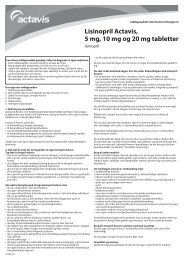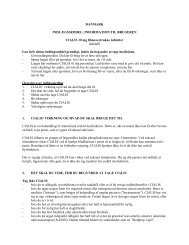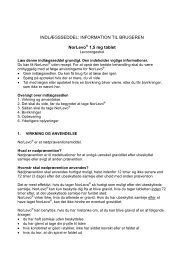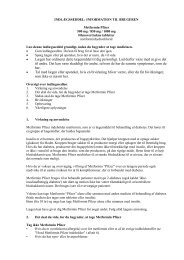Patient Information Leaflet - EuroClinix.dk
Patient Information Leaflet - EuroClinix.dk
Patient Information Leaflet - EuroClinix.dk
Create successful ePaper yourself
Turn your PDF publications into a flip-book with our unique Google optimized e-Paper software.
PACKAGE LEAFLET: INFORMATION FOR THE USER<br />
Paludrine /Avloclor Anti-malarial Travel Pack<br />
proguanil hydrochloride tablets (100 mg) and chloroquine phosphate tablets<br />
(250 mg)<br />
Read all of this leaflet carefully because it contains important information for you.<br />
This medicine is available without prescription. However, you still need to use your<br />
Paludrine/Avloclor Anti-malarial Travel Pack carefully to get the best results from it.<br />
• Keep this leaflet. You may need to read it again.<br />
• Ask your pharmacist if you need more information or advice.<br />
• If any of the side effects get serious, or if you notice any side effects not listed in this leaflet,<br />
please tell your doctor or pharmacist.<br />
In this leaflet:<br />
1. What Paludrine/Avloclor Anti-malarial Travel Pack is and what it is used for<br />
2. Before you use your Anti-malarial Travel Pack<br />
3. How to use your Anti-malarial Travel Pack<br />
4. Possible side effects<br />
5. How to store your Anti-malarial Travel Pack<br />
6. Further information<br />
1. What Paludrine/Avloclor Anti-malarial Travel Pack is and what it is<br />
used for<br />
The name of your medicine is ‘Paludrine/Avloclor Anti-malarial Travel Pack’. It is referred to<br />
as ‘Anti-malarial Travel Pack’ in the rest of this leaflet.<br />
Your Anti-malarial Travel Pack contains two types of tablets:<br />
• The Paludrine tablets contain a medicine called proguanil hydrochloride.<br />
• The Avloclor tablets contain a medicine called chloroquine phosphate.<br />
Both medicines belong to a group of medicines called ‘anti-malarials’.<br />
‘Anti-malarials’ can be used in certain parts of the world to help prevent malaria. This is a<br />
serious disease spread by infected mosquitoes. Your Anti-malarial Travel Pack will give some<br />
degree of protection (prophylaxis) against malaria in certain countries. It can be used when it is<br />
necessary to take more than one type of medicine at the same time to help prevent malaria.<br />
Medicines to help prevent malaria (malaria prophylaxis) are recommended for:<br />
• People travelling to countries where malaria occurs.<br />
• People living in malaria areas who are not immune to malaria.<br />
These people have little or no immunity to malaria, so they are at risk of severe attacks.<br />
You must get medical advice on which anti-malarial medicines to take. You must ask<br />
your doctor or pharmacist if this Anti-malarial Travel Pack is suitable for the part of the world<br />
that you are visiting.<br />
Page 1 of 7
Avoiding mosquito bites<br />
When you are taking this medicine to prevent malaria, you should also reduce the chances of<br />
being bitten by mosquitoes.<br />
• Wear light-coloured, long-sleeved clothing and long trousers when you are outside after<br />
sunset.<br />
• Use insect repellent creams or sprays on parts of your body not covered by clothing.<br />
• Sleep in a properly screened room or under a mosquito net.<br />
• Spray to kill any mosquitoes that may have entered rooms in spite of screening.<br />
If you have a high temperature<br />
No medicine can be guaranteed to protect against malaria in every case. If you have a high<br />
temperature (fever) during your visit to a malaria area, or up to a year after returning<br />
home, you should suspect malaria. Contact a doctor straight away and let him or her know<br />
that you have visited a malaria area.<br />
2. Before you use your Anti-malarial Travel Pack<br />
Do not use this Anti-malarial Travel Pack if:<br />
• You are allergic to proguanil hydrochloride, chloroquine phosphate or any of the other<br />
ingredients in the tablets (see Section 6: Further information).<br />
Take special care with this medicine<br />
Check with your doctor or pharmacist before taking your medicine if:<br />
• You have ever had epilepsy, convulsions or fits.<br />
• You have ever had problems with your liver or kidneys.<br />
• You have ever been told that you have a rare disease of the blood pigment called<br />
‘porphyria’ or anyone in your family has it.<br />
• You have a scaly condition of the skin called psoriasis.<br />
• You have a muscle problem called ‘myasthenia gravis’. Avloclor can increase the<br />
symptoms of this condition. It can also reduce the effect of medicines used to treat this<br />
condition (neostigmine and pyridostigmine).<br />
• You have a blood problem called ‘glucose-6-phosphate dehydrogenase deficiency’.<br />
Avloclor may damage blood cells in people with this blood condition.<br />
If you are not sure if any of the above apply to you, talk to your doctor or pharmacist before<br />
using your Anti-malarial Travel Pack.<br />
If you go into hospital, tell the medical staff that you are taking both Paludrine and Avloclor.<br />
If you live in a country where malaria occurs, you may already be slightly immune to the<br />
disease. You must ask a doctor or pharmacist for advice before you take anti-malarial<br />
medicines.<br />
Taking other medicines<br />
Please tell your doctor or pharmacist if you are taking, or have recently taken, any other<br />
medicines. This includes medicines that you buy without a prescription and herbal medicines.<br />
Tell your doctor or pharmacist if you are taking any of the following medicines. This is<br />
because Avloclor may affect the amount of these medicines in your blood.<br />
• Praziquantel (used to treat infections of the bowel and bladder caused by parasites).<br />
Page 2 of 7
• Cyclosporin (mainly used by transplant patients but also used to treat rheumatoid arthritis<br />
and psoriasis).<br />
• Anti-convulsant medicines (used to prevent convulsions or fits).<br />
• Digoxin (used to treat heart problems).<br />
Also tell your doctor or pharmacist if you are taking any of the following medicines:<br />
• Warfarin or other medicines used to prevent blood clots. Paludrine may increase the effect<br />
of these medicines.<br />
• Other medicines used to prevent malaria, such as mefloquine. There is a risk of<br />
convulsions or fits when these medicines are taken at the same time as Avloclor.<br />
• Cimetidine (used to treat stomach problems). This medicine affects how Avloclor is<br />
broken down by your body and may affect the amount of Avloclor in your blood.<br />
• Amiodarone (used to control the heart rate). Avloclor may increase the risk of uneven<br />
heart beats (cardiac arrhythmias) when it is taken at the same time as amiodarone.<br />
• Antacids (aluminium, calcium and magnesium salts that are used to treat heartburn or<br />
indigestion). Antacids may reduce the amount of Avloclor absorbed from your gut. This<br />
may mean that the full dose of Avloclor is not absorbed into your body and it will not<br />
work properly. Therefore, you should take your antacid dose at least two hours before or<br />
after taking your Avloclor dose.<br />
If you need a vaccination against rabies, make sure you have it before you start your<br />
anti-malarial medicine. If you have your rabies injection at the same time as taking your antimalarial<br />
medicine, your rabies vaccine might not work so well.<br />
Pregnancy<br />
If you are pregnant or may become pregnant, talk to a doctor or pharmacist:<br />
• before you use this Anti-malarial Travel Pack,<br />
• before you take any medicine to prevent malaria,<br />
• and before you go to a country where there is malaria.<br />
Breast-feeding<br />
• If you are breast-feeding, talk to a doctor or pharmacist before using your Anti-malarial<br />
Travel Pack.<br />
• Although Paludrine and Avloclor pass into the breast milk, the amount is not enough to<br />
protect your baby from malaria. Therefore, your baby will still need to be given antimalarial<br />
medicines. Ask your doctor or pharmacist who will be able to give you advice.<br />
Driving and using machines<br />
Sometimes Avloclor tablets cause blurred eyesight or make it difficult to focus your eyes. If this<br />
happens to you, do not drive or use any tools or machines.<br />
3. How to use your Anti-malarial Travel Pack<br />
If this medicine is from your doctor or pharmacist, take it exactly as they have told you.<br />
Otherwise, follow the instructions below. If you do not understand the instructions, or you are<br />
not sure, ask your doctor or pharmacist.<br />
When to start taking your medicine<br />
• Start taking this medicine one week before you enter the malaria area.<br />
Page 3 of 7
• You must continue to take it during your stay.<br />
• You must keep taking this medicine for 4 weeks after leaving the malaria area.<br />
Adults and children over 14 years<br />
• Take two Avloclor tablets once a week on the same day each week.<br />
• And take two Paludrine tablets daily, at the same time each day.<br />
Children<br />
Do not use this Anti-malarial Travel Pack in children under 1 year of age. For children over<br />
1 year of age, the dose depends on the child’s age.<br />
• Ages 1 to 4 years: Take half an Avloclor tablet once a week (on the same day each week)<br />
and take half a Paludrine tablet daily (at the same time each day).<br />
• Ages 5 to 8 years: Take one Avloclor tablet once a week (on the same day each week) and<br />
take one Paludrine tablet daily (at the same time each day).<br />
• Ages 9 to 14 years: Take one and a half Avloclor tablets once a week (on the same day<br />
each week) and take one and a half Paludrine tablets daily (at the same time each day).<br />
How to take your tablets<br />
• Take the tablet(s) after food.<br />
• Swallow the tablet(s), or part tablets, whole with a drink of water.<br />
• For a young child, the tablet(s) may be given crushed in milk, honey or jam.<br />
If you take more Paludrine or Avloclor tablets than you should<br />
If you take more Paludrine or Avloclor tablets than you should, talk to a doctor or go to a<br />
hospital straight away.<br />
If you forget to take your Paludrine tablets<br />
• If you forget to take a dose of Paludrine, take it as soon as you remember. However, if it is<br />
nearly time for the next dose of Paludrine, skip the missed dose.<br />
• Do not take a double dose (two doses at the same time) to make up for a forgotten dose.<br />
If you forget to take your Avloclor tablets<br />
• If you forget to take a dose of Avloclor, take it as soon as you remember.<br />
• Then wait for 7 days before you take the next dose of Avloclor.<br />
• Carry on taking your Avloclor tablets each week, on this new day of the week.<br />
Page 4 of 7
Stopping your Anti-malarial Travel Pack<br />
Only stop using your Anti-malarial Travel Pack four weeks after leaving the malaria area or if<br />
your doctor tells you to.<br />
If you have any further questions on the use of this product, ask your doctor or pharmacist.<br />
4. Possible side effects<br />
Like all medicines, your Anti-malarial Travel Pack can cause side effects, although not<br />
everybody gets them.<br />
Allergic reactions<br />
If you have an allergic reaction, stop using your Anti-malarial Travel Pack and get<br />
medical help or contact your doctor straight away. The signs may include:<br />
• Difficulty in breathing.<br />
• Swelling of the face, lips, tongue or throat which may cause difficulty in swallowing.<br />
• An itchy rash (similar to nettle rash or hives).<br />
Other possible side effects<br />
The more common side effects are:<br />
• Headache.<br />
• Stomach upsets, feeling sick (nausea), being sick (vomiting), diarrhoea, constipation,<br />
stomach cramps.<br />
The following side effects occur infrequently, or may occur if you use your Anti-malarial<br />
Travel Pack for a long period of time:<br />
Mouth<br />
• Mouth ulcers.<br />
• Inflamed mouth.<br />
Nervous system<br />
• Feeling dizzy or light-headed.<br />
• Convulsions or fits.<br />
• Mood changes or other effects on behaviour. These include feeling anxious or, rarely,<br />
seeing, feeling or hearing things that are not there (hallucinations).<br />
Skin<br />
• Skin rash, including a scaly rash (psoriasis) or itch, which sometimes causes swelling of the<br />
affected area.<br />
• A severe rash with blisters or peeling of the skin and possibly blisters in the mouth and<br />
nose.<br />
• Discolouration of the skin or mucous membranes (such as the inside of your mouth).<br />
• Being sensitive to sun light which may require medical treatment.<br />
Hair<br />
• Changes in hair colour.<br />
• Hair loss (sometimes reversible).<br />
Eyes<br />
• Blurred eyesight.<br />
• Some or complete loss of eyesight.<br />
Page 5 of 7
• Difficulty in focussing your eyes.<br />
• Double vision.<br />
• Changes to the retina of your eye(s) leading to ‘patchy’ eyesight (retinopathy).<br />
If you are using your Anti-malarial Travel Pack for a long time, your doctor may suggest that<br />
you have eye tests.<br />
Ears<br />
• Hearing loss.<br />
• Ringing in the ears (tinnitus).<br />
Blood<br />
• A reduced number of blood cells. This can make you bruise more easily, get serious<br />
infections, or feel very tired or breathless.<br />
If you are using your Anti-malarial Travel Pack for a long time, your doctor may suggest that<br />
you have blood tests.<br />
Heart<br />
• Changes in the way your heart works (known as ‘electrocardiographic changes’).<br />
• Weakening or change in the heart muscle (cardiomyopathy). This may make you feel tired<br />
or short of breath.<br />
Liver<br />
• Liver problems which may cause yellowing of your skin or the whites of your eyes.<br />
If you are using your Anti-malarial Travel Pack for a long time, your doctor may suggest that<br />
you have blood tests to check how well your liver is working.<br />
Lungs<br />
• Inflammation of the lungs causing a condition known as diffuse parenchymal lung disease.<br />
If you develop serious breathlessness or worsening of breathlessness seek prompt medical<br />
advice.<br />
Other<br />
• High temperature (fever).<br />
• Weakening of your muscles (neuromyopathy).<br />
Do not be concerned by this list of possible side effects. You may not get any of them.<br />
If any of the side effects get serious, or if you notice any side effects not listed in this leaflet,<br />
please tell your doctor or pharmacist.<br />
5. How to store your Anti-malarial Travel Pack<br />
• Keep your medicine in a safe place where children cannot see or reach it. Your medicine<br />
could harm them.<br />
• Do not store your medicine above 30 o C.<br />
• Protect the tablets from light and moisture.<br />
• Keep the tablets in the container they came in.<br />
• Do not use your Anti-malarial Travel Pack after the expiry date stated on the carton. The<br />
expiry date refers to the last day of that month.<br />
Medicines should not be disposed of via wastewater or household waste. Ask your pharmacist<br />
how to dispose of medicines that are no longer required. This will help to protect the<br />
environment.<br />
Page 6 of 7
6. Further information<br />
What Paludrine/Avloclor Anti-malarial Travel Pack contains<br />
Paludrine/Avloclor Anti-malarial Travel Pack contains two types of tablets, Paludrine tablets<br />
and Avloclor tablets.<br />
Paludrine tablets:<br />
• The active substance in Paludrine tablets is proguanil hydrochloride. Each tablet contains<br />
100 mg of proguanil hydrochloride.<br />
• The other ingredients are calcium carbonate, gelatin, magnesium stearate and maize starch.<br />
Avloclor tablets:<br />
• The active substance in Avloclor tablets is chloroquine phosphate. Each tablet contains<br />
250 mg of chloroquine phosphate (equivalent to 155 mg of chloroquine base).<br />
• The other ingredients are magnesium stearate and maize starch.<br />
What Paludrine/Avloclor Anti-malarial Travel Pack looks like and contents of the pack<br />
Paludrine tablets are white and round. They have a break line on one side with the letter ‘P’<br />
either side of the line.<br />
Avloclor tablets are white and round. They have a break line on one side and the letter ‘A’<br />
either side of the line.<br />
Paludrine/Avloclor Anti-malarial Travel Pack contains 112 tablets (98 Paludrine tablets and 14<br />
Avloclor tablets).<br />
Marketing Authorisation Holder and Manufacturer<br />
The Marketing Authorisation for Paludrine/Avloclor Anti-malarial Travel Pack is held by<br />
AstraZeneca UK Ltd, 600 Capability Green, Luton, LU1 3LU, UK.<br />
Paludrine/Avloclor Anti-malarial Travel Pack is manufactured by AstraZeneca UK Ltd, Silk<br />
Road Business Park, Macclesfield, Cheshire, SK10 2NA, UK.<br />
To listen to or request a copy of this leaflet in Braille, large print or audio please<br />
call, free of charge:<br />
0800 198 5000 (UK only)<br />
Please be ready to give the following information:<br />
Product name Paludrine/Avloclor Anti-malarial Travel Pack<br />
Reference number 17901/0037<br />
This is a service provided by the Royal National Institute of blind people.<br />
<strong>Leaflet</strong> updated: February 2010<br />
© AstraZeneca 2010<br />
Paludrine and Avloclor are trade marks of the AstraZeneca group of companies.<br />
INF 10 0004<br />
Page 7 of 7









